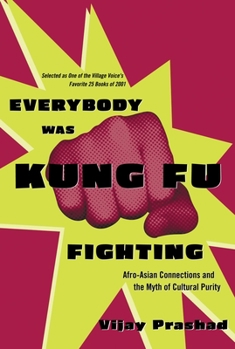Everybody Was Kung Fu Fighting: Afro-Asian Connections and the Myth of Cultural Purity
Select Format
Select Condition 
Book Overview
Selected as One of the Village Voice 's Favorite 25 Books of 2001 In this landmark work, historian Vijay Prashad refuses to engage the typical racial discussion that matches people of color against each other while institutionalizing the primacy of the white majority. Instead he examines more than five centuries of remarkable historical evidence of cultural and political interaction between Blacks and Asians around the world, in which they have exchanged cultural and religious symbols, appropriated personas and lifestyles, and worked together to achieve political change.
Format:Paperback
Language:English
ISBN:0807050113
ISBN13:9780807050118
Release Date:November 2002
Publisher:Beacon Press
Length:232 Pages
Weight:0.69 lbs.
Dimensions:0.6" x 5.9" x 8.8"
Customer Reviews
4 ratings
intellectually stimulating
Published by Thriftbooks.com User , 15 years ago
A good detailed overview of poly-culturalism in today's world. A hard read but good information if you stick with it.
interesting but frustrating
Published by Thriftbooks.com User , 18 years ago
This is not a straightforward book by any means. Vijay Prashad has written a book that is by turns, illuminating, fascinating and maddening. In many ways, reading this book is like one of those lively and entertaining conversations you have in British pubs with the local sagacious man: Prashad describes some tantalizing connections between Black and Asian liberation struggles and just as you think, "Aha, here comes the good bit", he does the authorly equivalent of popping off to the lavatory. And when he comes back, he has another bright idea to tell you about, and there's no sign at all of the first one. In all fairness to Prashad, the tidbits he has to recount are pretty interesting. For example he notes that W.D. Fard, the inspiration behind Elijah Mohammed's bizarre origin myth for the Nation of Islam was actually a New Zealander (half South Asian and half Maori) who came across the US border with Canada as an illegal immigrant in 1913. He also talks briefly about the truly inspiring AJA leftist Yuri Kochiyama, who worked with Malcolm and cradled his head as he lay dying at the Roseland ballroom. But there's no follow through. We wonder in vain as to what the implications or lessons of these vignettes are but Prashad never tells us. The most useful part of the book is the first half where Prashad presents a very useful theoretical analysis of the way race has been conceptualized and can be conceptualized in the future as a path to more effective and ongoing coalitions and hence to more effective social justice work. Prashad distinguishes 4 different modes for thinking about race: colorblindness, primordialism, multiculturalism and what he calls polyculturalism. Color blindness is the approach currently favored by mainstream conservatives (including many white liberals and elites of color) which argues that race should be ignored because the state and all our decisions as groups and individuals should be "above" race. As Prashad notes, colorblindness assumes the neutrality or benevolence of existing social and power relations. Prashad's discussion and analysis follows the standard radical critique of this way of thinking. Primordialism for Prashad is a kind of essentialist thinking about racial identity, where biology determines cultural, moral and intellectual qualities. Proponents of primordialism include the extremist supremacist groups such as the Ku Klux Klan but Prashad also discusses groups amongst communities of color who subscribe to similarly essentialist notions such as the Nation of Islam, Afrocentrists and Dalitcentric thinkers. For Prashad, race must be viewed within the context of capitalism and the effect of capital on different groups of people in different nation-states and different historical moments. Race alone is not an accurate descriptor of all the dimensions of privilege and oppression that exist within a society. In multiculturalism different races and ethnicities are treated as essentially equal
Optimism of the intellect!
Published by Thriftbooks.com User , 22 years ago
Strong, strong stuff--as thought-provoking and energizing as KARMA OF BROWN FOLK, and much more thoughtfully argued. But the guy needs to slow down and write a book as carefully and lovingly researched as his first (UNTOUCHABLE FREEDOM)!
a fabulous book
Published by Thriftbooks.com User , 23 years ago
vijay prashad has written another stunner of a book - sweeping in its subject matter, fresh in its analysis, and fun to read. a must for anyone interested in the thorny questions of race in the 21st century.





